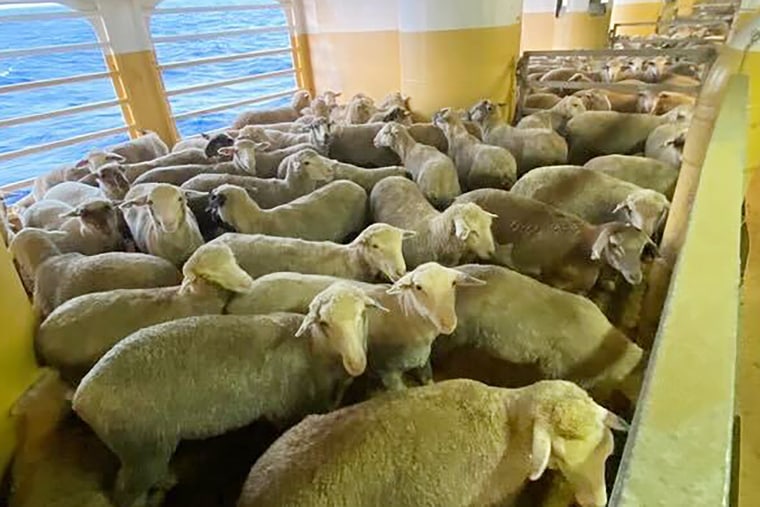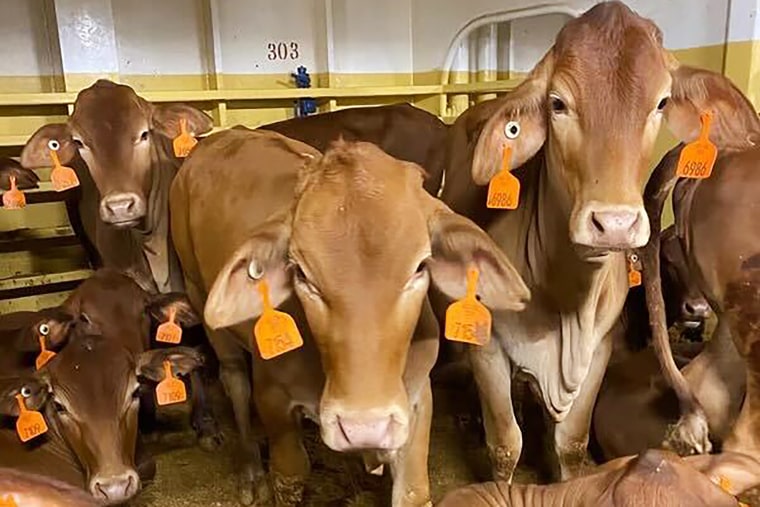Thousands of sheep and cattle are stranded off the coast of Australia after their ship was turned back by violence in the Red Sea, raising concerns among animal welfare groups about conditions on the vessel as the government decides what to do with them.
The ship, MV Bahijah, left for Israel on Jan. 5 from Fremantle, a port city in Western Australia, with 15,000 sheep and 2,500 cattle on board, according to Mark Harvey-Sutton, chief executive of the Australian Livestock Exporters’ Council.
On Jan. 20, the Australian agriculture and fisheries department said the ship had been ordered to return to Australia “due to the worsening security situation” in the Red Sea, where Iran-backed Houthi rebels based in Yemen have launched drone and missile attacks on commercial ships in what they say is retaliation for Israel’s military actions in the Gaza Strip.
The attacks have greatly disrupted maritime traffic in the Red Sea, a key shipping route, leading the U.S., the U.K. and others to launch strikes against Houthi targets as the Israel-Hamas war continues to expand throughout the region.
Australian officials said Thursday that the ship had been allowed to dock at the Fremantle Port but that no livestock could be unloaded due to Australia’s biosecurity regulations, which are among the strictest in the world.

The ship has been “resupplied essential provisions” and is undergoing routine cleaning, and a registered veterinarian is on board, the agriculture and fisheries department said in an update.
On Wednesday, two other veterinarians engaged by the department boarded the ship to examine the animals and found “no signs of significant health, welfare or environmental condition concerns,” it said, adding that along with biosecurity, the animals’ health and welfare are its “highest priorities.”
The department said it was working closely with the exporter to determine next steps for the animals as it considers whether to allow them to be re-exported.
Once marked for export and shipped out of the country, livestock cannot be sold in the domestic market again, Harvey-Sutton said.
“It’s a multibillion-dollar industry, and a lot of our market access is actually underpinned by the fact that we do not have a large number of livestock diseases,” he said. “And one of the ways that we maintain that status is by not letting animals go back on farm.”
If the animals are not re-exported, Harvey-Sutton said, they could be returned to Australia under stringent biosecurity conditions.
“They would go to a facility that is quarantined from other animals,” he said, where they would most likely remain indefinitely until a new buyer is found.
The Royal Society for the Prevention of Cruelty to Animals Australia (RSPCA) said it opposed re-exporting the livestock to Israel, a journey that would more than double the time they have already spent at sea. It also expressed concern for the animals as they sit in limbo, saying the stress of the situation could make them more vulnerable to disease and noting the high temperatures in Australia, where it is summer.

Temperatures in Perth, the metropolitan area that includes Fremantle, could exceed 102 degrees Fahrenheit on Friday, according to the Australian Bureau of Meteorology.
“They have already endured sustained heat and humidity, weeks of living in their own waste, crowding, unfamiliar environment and volatile movement of the ship,” Suzanne Fowler, the RSPCA’s chief science officer, said in a statement Wednesday. “To subject them to what could end up being a total of 60-plus days of this is inarguably unconscionable.”
The RSCPA and other groups oppose the live export of animals, and New Zealand banned such exports by sea last year after a ship bound for China sank in a typhoon in 2020, killing almost 6,000 cows and 41 out of the 43 crew members on board.
The Australian government has vowed to phase out live sheep exports but has not declared a timeline and would have to contend with the country’s powerful agriculture industry.
The animals stuck on the ship “will most likely just put on a lot of weight while they are traveling because all they have to do is sit and eat,” said John Hassell, chief executive of the Western Australian Farmers Federation.
“It’s an unfortunate situation. Nobody is really happy about it,” he said. “But this is the best outcome, to get it to its destination as soon as possible.”
